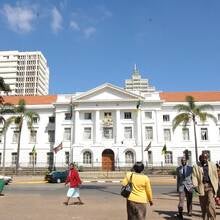Support positive economic, social and environmental links between urban, peri-urban and rural areas by strengthening national and regional development planning

Indicator 11.a.1 Number of countries that are developing and implementing a National Urban Policy or Regional Development Plans that (a) respond to population dynamics, (b) ensure balanced territorial development, and (c) increase local fiscal space
National Urban Policies and Regional Development Plans (NUP-RDP) promote coordinated urban development. This indicator is measurable: UN-Habitat has worked for over five years to develop tools for its measurability. It is also implementable: UN-Habitat has been working in over 40 countries to support the development and implementation of policies and plans. NUP-RDP are fundamental to build linkages between human settlements of various sizes within a national system of cities. They can bring together sectorial policies; connect national and sub-national governments; and strengthen urban, peri-urban, and rural links.
NUP-RDP are excellent tools for resource allocation across cities to reduce spatial inequalities. Numerous tools are available which contain existing data on national urban policy and regional development plans and can act as key elements of a methodological framework for this indicator.
In the countries where NUP and RDP are being implemented, harmonious development of the social, economic and environmental dimensions of sustainability can be more easily achieved
- 152 countries (76% of the world) have or are developing a National Urban Policy
- Information for 135 countries can disaggregated by key themes of the sustainability agenda
- National Urban Policies contribute to define a more structured and efficient system of cities, in which each human settlements play an important role in national development
Our Work
Pursuing Sustainable Urban Development through National Urban Policies, Regional & Metropolitan Planning
Improved national urban policies (NUP) and spatial frameworks for compact, integrated and connected cities adopted by partner metropolitan, regional and national authorities. While undertaking NUP, UN-Habitat and its partners will support positive economic, social and environmental links between urban, peri-urban and rural areas as a means to contribute to harmonious development of the social, economic and environmental dimensions of sustainability.
Budget: US$ 2,900,000 - US$10,000,000
Project active in over 40 countries globally, in partnership with UNECA, UNECWA, UNECE, UNCRD
Municipal Development Programme; Revenue Enhancement Project and Rapid Assessment Project.
Revenue Enhancement and Rapid Assessments boost economic growth by building capacity for municipalities that aid in revenue collection and management that’s necessary for service delivery, financing infrastructural development and planning. The project has been implemented in Kenya and revenues enhancement has already impacted collections in Kiambu.
Budget: US$ 150,000
Preliminary results from the rapid assessment in Homabay are already indicating the status and policy direction to take
Development of a National Urbanization Policy - Sudan
Sudan has not yet developed any national policy related to urbanization or housing, despite the urgent need to respond to rapid urbanization. Percentage of people living in urban areas has increased from 20% in 1980 to 35% in 2013. Compressive review and development of existing urban planning laws and regulations, including those related to investment in housing, basic services and infrastructure, security of tenure and LPH rights, and formulation of a sustainable urbanization policy to respond to rapid urbanization.
Budget: US$ 3,000,000
To be implemented in partnership with UNDP
Sustainable, Inclusive and Evidence-based National Urban Policies in selected Arab States
The project provides technical support to preparation and refinement of National Urban Policies in selected Arab countries. It aims to enhance technical and institutional capacities of national, sub-national and local governments to strengthen their national urban policy-making processes, and increase awareness of countries in the region of tools, frameworks, procedures and best practices in national urban policy making.
Budget: US$451,000
Implemented in partnership with ESCWA, AUDI, ATO
